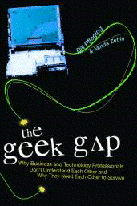How Does Oscar Know?
I should apologize right up front, because this post is not about technology. Or business. It's about a cat, I'm sorry to say. But it's also about trying to figure out how things work, which is the essence of what geeks do.
Today, I read about Oscar, a two-year-old cat who has lived most of his life on the third floor of Steere House Nursing and Rehabilitation Center in Providence, Rhode Island. Where he lives is not a particularly happy place, at least not for the patients there. It's a dementia unit, full of very elderly people with advanced disease, such that they no longer recognize their loved ones, or know where they are, or perhaps even who they are. Patients don't go home from units like this one. They are, in many cases, waiting to die.
This is where Oscar comes in. At some point, the nursing staff noticed that the cat was making rounds, just the way the doctors did, checking out each patient. Sometimes he would pick one to curl up next to. And when he did, it was a sure sign that this particular patient would be dead within a few hours.
So far, Oscar has settled in at the deathbeds of 25 patients, and the Steere House staff find his presence such a dependable predictor that whenever he curls up next to someone and stays, they call the patient's family and alert them that death is imminent. A local hospice agency has put put a plaque awarded to Oscar "for his compassionate hospice care."
Very amazing and very sweet, but I'm left with the question: how does it work?
I should begin by saying I'm convinced that Oscar is not unique in the feline world. Anyone who lives side by side with cats, as I have for most of my life, knows they have some abilities, especially sensory abilities, that can seem quite mysterious.
Some observers have suggested that the cat identifies the dying by smell, and this is certainly possible, but cats don't have a uniquely good sense of smell in the animal kingdom, though it's 14 times better than the rudimentary sense of smell we humans are left with.
I tend to suspect hearing: cats actually hear higher frequencies than dogs, and are finely attuned to the slightest changes in sound (which helps them catch stealthy rodents). Once when I was out somewhere, Bill was hanging out on our porch with our late lamented cat Truman. Truman was sleeping, but suddenly he jumped up, walked to the door and waited there expectantly. Nothing happened for a while, but after a few minutes, Bill heard a car in the distance, which proved to be my car. Truman must have recognized the particular tone of my engine compared to all other engines, and heard it when I was still at least half a mile away. Maybe there's some difference in the sound a dying person makes, in his or her breathing that Oscar can identify.
The other factor is that cats care. For whatever reason, cats are inexorably drawn to humans in in distress. Most people who live with cats have experienced having a bad emotional upset, or feeling particularly unwell, and having the cat insist on snuggling up to you. One standoffish cat who never ever jumped up on our bed spent an entire afternoon in bed with me, stretched out against my leg when I was laid up with a bad flu.
I'm not entirely sure what the explanation is for this either, but it leads to another possibility to consider: Maybe most animals can tell when a terminally ill human is about to die. Maybe cats are the only ones who respond such that we can tell that they know.
Today, I read about Oscar, a two-year-old cat who has lived most of his life on the third floor of Steere House Nursing and Rehabilitation Center in Providence, Rhode Island. Where he lives is not a particularly happy place, at least not for the patients there. It's a dementia unit, full of very elderly people with advanced disease, such that they no longer recognize their loved ones, or know where they are, or perhaps even who they are. Patients don't go home from units like this one. They are, in many cases, waiting to die.
This is where Oscar comes in. At some point, the nursing staff noticed that the cat was making rounds, just the way the doctors did, checking out each patient. Sometimes he would pick one to curl up next to. And when he did, it was a sure sign that this particular patient would be dead within a few hours.
So far, Oscar has settled in at the deathbeds of 25 patients, and the Steere House staff find his presence such a dependable predictor that whenever he curls up next to someone and stays, they call the patient's family and alert them that death is imminent. A local hospice agency has put put a plaque awarded to Oscar "for his compassionate hospice care."
Very amazing and very sweet, but I'm left with the question: how does it work?
I should begin by saying I'm convinced that Oscar is not unique in the feline world. Anyone who lives side by side with cats, as I have for most of my life, knows they have some abilities, especially sensory abilities, that can seem quite mysterious.
Some observers have suggested that the cat identifies the dying by smell, and this is certainly possible, but cats don't have a uniquely good sense of smell in the animal kingdom, though it's 14 times better than the rudimentary sense of smell we humans are left with.
I tend to suspect hearing: cats actually hear higher frequencies than dogs, and are finely attuned to the slightest changes in sound (which helps them catch stealthy rodents). Once when I was out somewhere, Bill was hanging out on our porch with our late lamented cat Truman. Truman was sleeping, but suddenly he jumped up, walked to the door and waited there expectantly. Nothing happened for a while, but after a few minutes, Bill heard a car in the distance, which proved to be my car. Truman must have recognized the particular tone of my engine compared to all other engines, and heard it when I was still at least half a mile away. Maybe there's some difference in the sound a dying person makes, in his or her breathing that Oscar can identify.
The other factor is that cats care. For whatever reason, cats are inexorably drawn to humans in in distress. Most people who live with cats have experienced having a bad emotional upset, or feeling particularly unwell, and having the cat insist on snuggling up to you. One standoffish cat who never ever jumped up on our bed spent an entire afternoon in bed with me, stretched out against my leg when I was laid up with a bad flu.
I'm not entirely sure what the explanation is for this either, but it leads to another possibility to consider: Maybe most animals can tell when a terminally ill human is about to die. Maybe cats are the only ones who respond such that we can tell that they know.



0 Comments:
Post a Comment
Subscribe to Post Comments [Atom]
<< Home